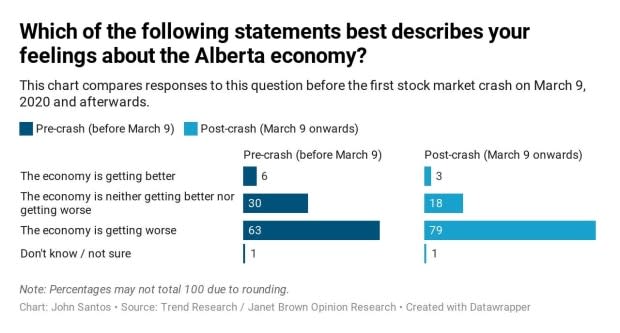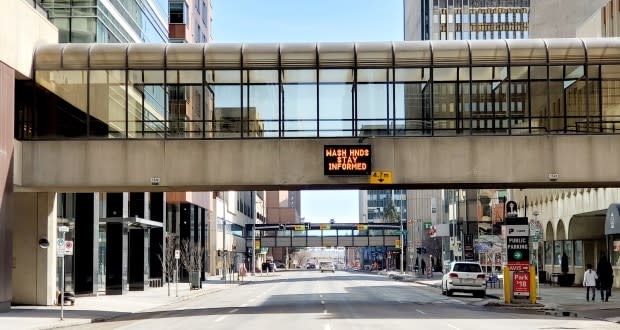CBC News poll: Albertans were already anxious. Then, the floor dropped out
Editor's note: CBC News commissioned this public opinion research before concerns about the COVID-19 pandemic mounted. About half of the total survey of 1,200 respondents was conducted before stock markets and oil prices plunged (March 2-8). The other half of the interviews took place after this economic shock (March 9-18). Growing concerns about the pandemic continue to shape public attitudes.
As with all polls, this one is a snapshot in time. CBC News — and the public opinion experts consulted on this survey research — believe the data offers some valuable insights into Albertans' attitudes about the economy and politics just at the moment when COVID-19 changed everything.

Albertans were already anxious about the economy as oil prices hit historic lows in mid-March. Then, the floor fell out from under their feet in the wake of a worldwide pandemic.
CBC News was polling Albertans as the economic shock hit.
Our telephone and online survey of 1,200 Albertans was conducted between March 2 and March 18. Half of the poll was completed before worldwide markets crashed and oil prices cratered after Saudia Arabia and Russia faced off in a war over oil prices on March 9. The remaining, roughly 600 respondents, were surveyed after oil prices plunged.
Even before the market free fall, 63 per cent of Albertans said they expected the economy to get worse. After the oil crash, that number jumped to 79 per cent.
Economic crash
"Albertans were already extremely anxious about the economy," said Calgary-based pollster Janet Brown, who conducted the poll for CBC News. "It's just logical to expect that Albertans are only feeling more anxious now."
The graph below shows the sudden impact of the oil price crash and COVID-19 concerns.

These are the most recent numbers, but we can compare them to a similar poll that CBC News did in 2018, when we asked the same question.
Two years ago, 45 per cent of Albertans said they thought the economy was getting better. By March 18 this year, a mere four per cent of Albertans were optimistic about things improving.
In the graph below, you can see the comparisons between the two polls, and the extent of the economic concerns, with confidence already slipping because of economic woes before COVID-19.

"Two years ago," said Brown, "most people thought the worst was behind us. And very few people were expecting … an even worse economic situation in the future."
"Now, fast forward two years and we actually have 71 per cent of people expecting the economy to get worse."
And that was before layoffs in the oilpatch began and the true ramifications of the pandemic became clear — not that the depth of those ramifications are clear even yet.
In this latest poll from just weeks ago, we find (no surprise) the economy was the single most important issue that was top of mind for Albertans, with 24 per cent of them mentioning it first.
The energy industry, pipelines (15 per cent) and jobs or employment (13 per cent) — which can be considered a proxy, or related to the economy — came second and third in mentions.
When you add those numbers up, CBC News' poll suggests that, as of March 18, economic issues topped the list of concerns for 52 per cent of Albertans.
Once again, that was before cases of COVID-19 began to rise across the province — before the widespread layoffs began and self-isolation became a way of life. Those pressures will continue to change how Albertans feel.
"I'm expecting public opinion to change on just about every measure," said Brown.
"This is the kind of shock that really will get people thinking about all aspects of government."
Health-care concerns
Notably, the CBC News poll did detect growing concerns about COVID-19.
People were asked an open-ended question: What's the most important issue facing Alberta?
In the first half of the survey (before March 9), only four per cent of respondents mentioned concerns about the coronavirus. In the latter half of polling, mentions of COVID-19 rose substantially, with 17 per cent of respondents saying it is an issue of concern for Alberta.
Concern about health care is also up from two years ago. More than a quarter of the Albertans surveyed mentioned health care as an important issue facing the province in the most recent poll.
Only 20 per cent of Albertans mentioned health care when asked the same question in 2018. Concerns about government spending and education have also risen over the past two years.
With the COVID-19 pandemic testing Alberta's health-care system like it's never been before, concerns about the public medical system are likely to grow, predicts Brown.
"We're going to be focused on our health-care system and how to keep that strong … get it back into shape after the shock of COVID," she said.
But at the same time, Brown notes Albertans will also be worried about the economy and how they are going to pay their bills.
"We're going to be looking for our … leaders to show both leadership, when it comes to the social agenda and social policies, but also leadership when it comes to the economy," Brown said.
Fixing this won't be easy. There is no roadmap.
Future financial challenges
Already, Premier Jason Kenney has warned Albertans to prepare for economic adversity not seen since the 1930s.
As he said in a recent press conference, "Let me be blunt with Albertans. We are facing what will likely be the largest single contraction in our economy in our history."
That's echoed by others.

"We're dealing with a combination of a health crisis and an economic crisis simultaneously. It would be as if you had the Spanish flu and the Great Depression happening at the same time," said Duane Bratt, head of the department of economics, justice, and policy studies at Mount Royal University.
With the collapse of oil prices, and the subsequent royalty shortfall, along with the billions the province is spending to support individuals and businesses during the COVID-19 outbreak, our province is facing serious debt problems.
Our survey data shows, when the poll was conducted, a slight majority (52 per cent) of people in Alberta thought it was OK to run a deficit. That's up 14 percentage points since CBC News asked the same question in 2018.
Historically, polls have suggested that Albertans are debt averse when it comes to public finances.
"Here in Alberta, we don't like debt," said Brown. "So it's the question that all Albertans will have to ask themselves: how much debt are they comfortable with their government taking on in order to … get the economy back on track?"
"But what's more important to voters is that the government is making the right decision in the right circumstances. And Albertans will understand that circumstances have changed," Brown added.
Premier Kenney has already announced the creation of an economic recovery panel to help plan for the province's future, although until the economic consequences are apparent, through the passage of time, that will be difficult.
Changing world, changing fears
The CBC News poll captures Albertans' feelings only up to the end of the survey period.
Undoubtedly, concern about the economy, health care and many other issues has increased in the days since.
Still, this poll shows how Albertans were feeling in the face of troubling economic headwinds.
The poll offers a sense of where Albertans were before the pandemic crisis took hold.
"We now know the starting point. I don't know the ending point. I don't know when this ball is going to quit bouncing. But this survey gives us a good insight into where Albertans were when the floor dropped out," said Brown.
And to find out how COVID-19 may be shaping and changing how Albertans feel about the economy and politics, CBC News plans to conduct another survey in the coming months.
"I want to check in again with how people are feeling about the economy. I also want to know how they're feeling about their own personal circumstances and how the pandemic might be changing their attitudes," said Brown.
Methodology:
The CBC News random survey of 1,200 Albertans was conducted using a hybrid method between March 2 and March 18, 2020, by Edmonton-based Trend Research under the direction of Janet Brown Opinion Research. The sample is representative along regional, age and gender factors. The margin of error is +/- 2.8 percentage points, 19 times out of 20. For subsets, the margin of error is larger.
The survey used a hybrid methodology that involved contacting survey respondents by telephone and giving them the option of completing the survey at that time, at another more convenient time, or receiving an email link and completing the survey online. Trend Research contacted people using a random list of numbers, consisting of half land lines and half cellphone numbers. Telephone numbers were dialled up to five times at five different times of day before another telephone number was added to the sample. The response rate among valid numbers (i.e. residential and personal) was 13.2 per cent.


